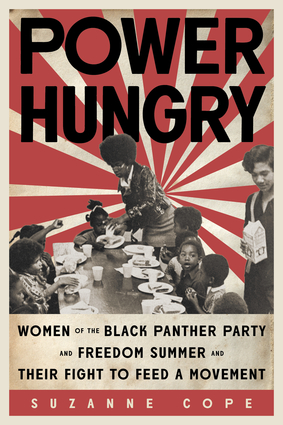Overview
The parallel stories of Aylene Quin and Cleo Silvers, two unsung women whose power using food as a political weapon during the civil rights movement brought the ire of government agents working against the movement
In early 1969 Cleo Silvers and a few Black Panther Party members met at a community center laden with boxes of donated food to cook for the neighborhood children. By the end of the year, the Black Panthers would be feeding more children daily in all of their breakfast programs than the state of California was at that time.
More than a thousand miles away, Aylene Quin had spent the decade using her restaurant in McComb, Mississippi to host secret planning meetings of civil rights leaders and organizations, feed the hungry, and cement herself as a community leader who could bring people together—physically and philosophically—over a meal.
These two women’s tales, separated by a handful of years, tell the same story: how food was used by women as a potent and necessary ideological tool in both the rural south and urban north to create lasting social and political change. The leadership of these women cooking and serving food in a safe space for their communities was so powerful, the FBI resorted to coordinated extensive and often illegal means to stop the efforts of these two women, and those using similar tactics, under COINTELPRO--turning a blind eye to the firebombing of the children of a restaurant owner, destroying food intended for poor kids, and declaring a community breakfast program a major threat to public safety. But of course, it was never just about the food.
Reviews
“One of the joys—
and reliefs—
of living in this moment is witnessing overlooked, silenced, and marginalized people and their histories be restored to their rightful place: our collective awareness and cultural and historical canon. Cope's work is a valuable addition to that of other scholar activists and invites all readers to learn, reflect, and continue to strive to develop a fuller, fairer, more accurate accounting of history.” —Julie Schwietert Collazo, cofounder and director of Immigrant Families Together and coauthor of
The Book of Rosy:
A Mother's Story of Separation at the Border“Suzanne Cope does a masterful job of telling the story of the modern civil rights movement through the lens of two of its unsung heroes—Aylene Quin and Cleo Silvers. These women understood both the practical and ideological power of a hot meal and a full belly, but most important they knew how to use traditional women’s work to quietly build a revolution. Cope’s absorbing prose keeps you turning the pages. For everyone with an interest in activism, women’s history, or the history of civil rights, this is an essential and delicious read.” —Gretchen Sullivan Sorin, director and distinguished professor of Cooperstown Graduate Program
“A work of dedication, force, and importance. Power Hungry restores unsung heroes of the civil rights movement, Cleo Silvers and Aylene Quinn, to their rightful place in history. The book gives pride of place to spheres of activism often overlooked because they are led by women of color and focused on feeding and caring for children. Cope's engaging storytelling and dogged research remind us that not all lost stories need remain lost.” —Tana Wojczuk, author of
Lady Romeo: the Radical, Revolutionary Life of Charlotte Cushman, America’s First Celebrity"Part of the whitewashing of Black history has been the inattention paid to the contributions of Black women. No more. In the well-researched Power Hungry, Suzanne Cope holds up the myriad ways Black women supported the fight for civil rights by organizing, educating, and feeding, literally, the movement. At the center of the book are the stories of the Black Panther Party’s Cleo Silvers and of Aylene 'Mama' Quin of McComb, Mississippi—women who imbued voting rights activists with hope, stamina and joy via food and community. Their lives speak to inspiration and determination and are as relevant today as they were in 1968." —Katherine Dykstra, author of What Happened to Paula
"For enslaved African American people, their legacy, trust . . . the generational wealth of their descendants was rooted in food. Beyond just sustainability, food has been the currency of a people who experienced the power of ownership and value through each and every grain, crop, or dish they grew and cooked from scratch. Suzanne Cope in the pages of her new book not only understands this paradox but amplifies the story of how two women of color living separate lives in different places in America mirrored the impact of this truth as they feed a movement for change, lifting their communities one plate at a time." —
Alexander Smalls, James Beard–winning chef and author of
Meals, Music and Muses and
Between Harlem and Heaven "Required reading…Cope expertly contextualizes scholarship with the voices of the women who lived through the Freedom Summer." —
Buzzfeed News"A worthy tribute to the unsung heroines of the fight for racial equality." —
Publishers Weekly"An overlooked and inspiring story of female heroism on the civil-rights front." —
BooklistAuthor Biography
Suzanne Cope is a writing professor at NYU who has been researching and writing about food and politics for years. Her articles have been published in the New York Times, Washington Post, Atlantic, and Travel & Leisure, as well as with the BBC, CNN, Buzzfeed, NPR, and more. She speaks on related topics on radio shows and podcasts, and at numerous professional and scholarly meetings. Cope lives in Brooklyn, NY.
 Mother's Day
Mother's Day Father's Day
Father's Day
